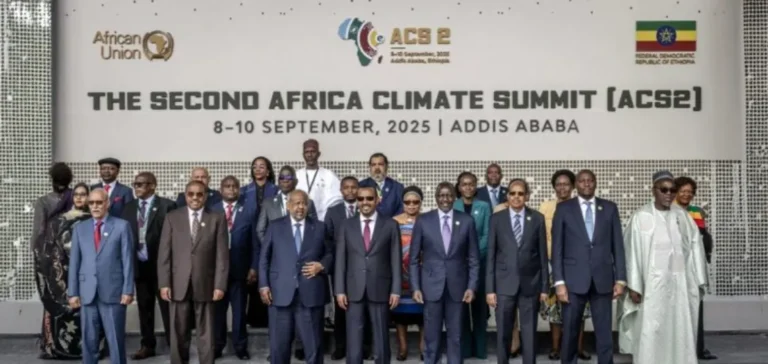Le président de la Commission de l’Union africaine, Mahmoud Ali Youssouf, a lancé un appel à la révision des cadres réglementaires du financement climatique avant l’ouverture de la Conférence des parties (COP30) à Belém. Selon lui, les engagements financiers des pays industrialisés envers les nations vulnérables ne peuvent plus être différés ni présentés comme des gestes volontaires, mais doivent s’inscrire dans des mécanismes juridiquement contraignants.
Une régulation jugée insuffisante face à l’urgence climatique
Mahmoud Ali Youssouf a rappelé que l’Afrique, responsable de moins de 4 % des émissions mondiales de gaz à effet de serre, continue de subir les effets les plus sévères du changement climatique. Il a souligné que l’absence d’un cadre réglementaire clair sur la mobilisation et la distribution des fonds limite l’efficacité des politiques d’adaptation. L’Union africaine milite pour la mise en œuvre intégrale de l’objectif mondial d’adaptation (Global Goal on Adaptation – GGA), afin de rendre le financement climatique plus prévisible et conforme aux engagements internationaux.
L’Afrique s’appuie déjà sur plusieurs instruments institutionnels pour renforcer sa résilience, notamment la Stratégie climatique de l’Union africaine (2022–2032), la Décennie de l’agriculture intelligente, la Stratégie de l’économie bleue et le programme Mission 300. Ces cadres fixent les orientations politiques régionales, mais leur mise en œuvre reste conditionnée à la régularité des ressources financières promises.
Un écart croissant entre les besoins et les flux réels
Le Programme des Nations unies pour l’environnement (PNUE) indique dans son Adaptation Gap Report 2025 que les besoins de financement pour l’adaptation dans les pays en développement atteignent environ 310 milliards $ par an. En comparaison, les flux publics internationaux destinés à ces projets se limitaient à 26 milliards $ en 2023. Cet écart d’un facteur de 12 à 14 illustre la fragilité du système actuel, où les contributions reposent sur des engagements non contraignants et difficilement vérifiables.
Le Glasgow Climate Pact, adopté pour doubler les financements d’adaptation entre 2020 et 2025, n’a pas atteint ses objectifs. Pour l’Union africaine, cette situation démontre la nécessité d’une réforme des règles internationales encadrant la transparence, la traçabilité et la conformité des engagements climatiques.
Vers un cadre international plus cohérent
Les discussions à Belém devraient, selon les diplomates africains, aborder la question d’un mécanisme de régulation global du financement climatique. L’Union africaine souhaite que la COP30 établisse un dispositif de gouvernance plus clair pour éviter la dispersion des fonds et garantir leur accès direct aux États bénéficiaires.
Mahmoud Ali Youssouf a rappelé que la crédibilité des négociations dépend désormais de la capacité des pays développés à traduire leurs promesses en engagements juridiquement opposables. Pour les États africains, une régulation internationale renforcée constitue une condition essentielle à la mise en œuvre effective des politiques d’adaptation et de stabilité économique.






















